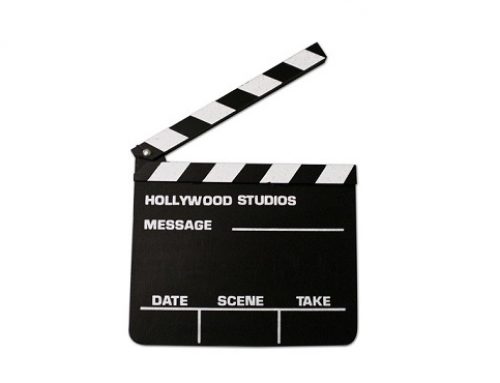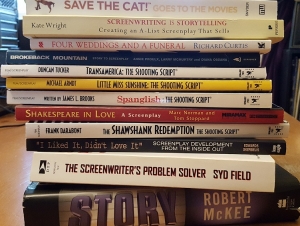by Renée Lukas
(In a previous blog I mentioned how hard it can be for writers approaching middle age to steer their career in the right direction. Today’s topic: screenwriting.)
 As Tom Hanks said in A League of Their Own, “If it was easy everyone would do it.”
As Tom Hanks said in A League of Their Own, “If it was easy everyone would do it.”
Some careers feel more like a calling. You can’t NOT do the work. This is probably the only reason you should be a writer. You have to feel compelled to tell a story. If you do it for fame and fortune, prepare to be disappointed.
Why Be a Screenwriter?
Screenwriting is the worst of all writing careers AND one of the most rewarding. Seeing your work on the big or small screen and knowing the mountain you climbed to get there is worth it all. But there’s a lot you’ll have to endure to get there.
First the bad news: getting a script sold can feel like the same odds as winning the lottery. And if you do sell one, it can languish in a studio vault somewhere and never see the light of day if the studio decides not to produce it.
If you write a spec screenplay, your ownership of it is fleeting. It will likely be rewritten by more than one person, and it may emerge as something you don’t even recognize when all is said and done. Pretty Woman was supposed to be a sad story about a prostitute without a happy ending. But in spite of the changes, screenwriter JF Lawton was happy to get it made.
Why am I telling you all of this? As long as you know what you’re getting into, you won’t be so shocked and outraged when things don’t go your way, as is the case with a lot of newbie writers.
The Worst-Case Scenario for Your Screenplay
It’s better to be rejected outright than to come so close and THEN be rejected. But it happens more often than not. It’s the scenario where you get a significant amount of interest, or buzz, about your project. You get high-level meetings. You even learn what the inside lobby of a major studio looks like. But for whatever reason—last-minute cold feet from the studio, a change in direction, a new executive brought on to replace the one who loved your project, or the moon is suddenly in Capricorn—your project is suddenly dead in the water.
It could be something as simple as an animal network that once loved your puppy story telling you they’ve decided to go with an all-monkey format. Ouch!
It seems unfathomable because with most things in life, the closer you get, the better your chances of something. If you get close to a finish line, you’ll complete a race. Not so with screenwriting. The closer you get means nothing. You could get so close, then be just as far away as when you started.
This happened to me, and it felt so unbelievable, even unbearable. I thought it was a bad, absurd dream. And someday, I’ll probably take you along through the course of how my project made it, when it does make it, with all the heartbreaks along the way (“Anatomy of a Dream”, coming soon to a blog near you!)
If your script does sell, you can experience the joy of sharing your vision, your characters, your hard work, with a broad audience. The financial rewards vary between projects, but option agreements can be quite lucrative. A word of caution: money is not something you can count on consistently in the world of screenwriting. See a theme here?
If your plan is to sell screenplays to pay your rent, you might want to dust off your resume and look for more traditional jobs while you work on scripts in your spare time. In my twenties, I spent many lunch hours in a grocery store parking lot, pounding out scenes that would later attract a producer.
This can be especially difficult in middle age when your peers are all settled in “normal” careers, having achieved levels like vice president of (fill in the blank) and have a nice 401k. Part of you will still feel like a floundering college kid who’s still trying to make it, and it can be disheartening. Don’t underestimate this psychological toll. It will feel like you can only have mac ‘n cheese while your friends enjoy filet mignon. You have to actively work hard to push through any negative feelings. Exercise and / or yoga has never helped me when I’ve felt bad about this. I just remind myself to stay in my lane, feeling genuine happiness for others who are doing well in their chosen professions. If the feeling persists, I’ve been known to binge eat Ben & Jerry’s and Cheetos until the feeling passes. A more healthier way to combat these negative feelings is to dive right back into your work until it passes.
Getting There
For middle-aged writers, there are some unique challenges with the field of screenwriting. Let’s say you either have some experience writing screenplays or have decided to take up screenwriting after a career in something else. Your next steps depend on which camp you fall into. If you’ve already studied screenwriting, jump down to the next section to chart a course. If not, you’ll need to decide how best to learn the craft. And don’t believe every story you’ve heard. I don’t believe anyone can write a successful draft in one day in a bathroom. If that’s you, congratulations. But it still seems weird.
If you already have a Bachelor’s degree, an MFA in Screenwriting could give you possible industry contacts and many of the essentials to write a solid screenplay. But keep in mind, when you’re over 40, taking out loans may not be a path you want to take. And screenwriting is one of those careers that doesn’t require a degree to succeed, much to the chagrin of academics everywhere. A good script is a good script. So if money is an issue, there are many books, online courses and regular blogs that take a deep dive into the craft and can help teach you without costing a fortune.
I recommend blogs like Go Into the Story that tackle all aspects of screenwriting. Most of all, read screenplays! There are countless websites that let you download produced film scripts for free. You can learn so much from reading your favorites AND the ones you don’t like. No matter what I read, I always come away with some new nugget of wisdom, even if it’s just: “Hey, they didn’t use ‘CONTINUOUS’ in their slug lines!”
If you’ve already taken some courses but would like to get better, this advice applies to you, too. You can also join writers’ groups where you can practice pitching ideas to each other and getting real feedback as to what hooks people and what doesn’t. This was very valuable to me. Even though I’d studied film and screenwriting in college, I later joined a screenwriters’ group to discuss structure and plot issues in my scripts and offer feedback to other writers. It was surprisingly great! Trying to figure out what works and what doesn’t in someone else’s script can actually help you with your own work.
After you’ve put in the hard work to learn how to do it, you’ll have to decide which route is best for you.
Should you write for film or television? You may already know the answer based on what types of scripts you tend to write the most and enjoy doing. If this is the case, lucky you! Pour your blood over Dauntless and get going! (If you haven’t seen Divergent, never mind.)
Feature Films Vs. Television
If you’re over 40, feature scripts may be a better bet than writing for television, especially if you don’t live in L.A. Older writers often have spouses, kids and family commitments that make it extra difficult to pack up and move to L.A. Don’t let L.A. residents guilt you or make you feel like you’re not serious about your career if you stay where you are. I’ve even heard it said that writers from out of town can be considered more interesting because they’re exposed to different landscapes and ideas than the writers stuck on the 405 every day, interacting with the same things. (I could swear I read this somewhere. If I didn’t, it makes me feel better, so I’m going with it.)
If you don’t want to put your relationship through the strain of long distance, you could be like me and use Skype and email to help build your career. I actually found an amazing producer through Twitter and use Skype to have meetings where I feel in the loop about my projects. So this route is very possible.
Option agreements vary, and depending on what you’ve written, you may see a huge pay day that enables you to work on other projects while staying financially afloat. If you’ve written the next Twilight, you could certainly consider buying the big house with the pool. If you sold an indie script about a guy in Kansas who makes French fries, you might earn some extra spending money. But don’t quit your day job.
With television writing, you typically have to live in L.A. to work on a staff of writers for a TV series. And you’ll be competing with young writers who started out early and have already amassed a bunch of credits. But it’s okay if that’s your passion. Go for it! Unfortunately, some fellowship programs are only offered to younger writers, which I think is totally narrow-minded and wrong. But like everything else with this business, there’s more than one way to break in.
If you’re willing to pick up stakes and move to L.A., and are open to feedback and mentoring by writers of all ages, then television is definitely an option. But don’t rely on this as a job that will support you, at least not at first. You will make money per episode, but the show could be cancelled without warning. I knew someone who worked on a hit show and when it was done, he had to take odd jobs to support his family in between shows. Luckily, he found another one. But you never know. So you can’t count on this career financially until you’ve had some long-term success.
The Benefits of Being an Older Screenwriter
If you’re over 40, you’ve gained a lot of life experience, enabling you to dig deeper into your stories. You’ve also met more people who have given you a wealth of characters with which to populate your stories. You have so much to offer, more than you ever did at 20.
Unfortunately, some studio execs will have misconceptions about you. They may assume that, if you’re over 20, you’re set in your ways and unable to take feedback. They may think that only younger writers can be molded and shaped into award-winning scribes. You’ll have to work hard to dispel these erroneous beliefs. This can be even harder if the executives you talk to are younger than you, with names like Chad and Tiffany, who weren’t born yet when you were studying classic films. But you can still find common ground with Chad and Tiffany; don’t let that discourage you! (Sorry if your name is Chad or Tiffany.)
The truth is, you know yourself better than younger writers typically do. You know your strengths and weaknesses and can, hopefully, play to your strengths. I’d like to say I care less what others think now than I used to. But if I’m face to face with someone who can make or break my script, it’s just as nerve-wracking, no matter how old you are.
The Drawbacks of Being an Older Screenwriter
I was talking to a producer who built a Rolodex of contacts for over 20 years. Think about that. To earn the trust of someone takes time. You can’t just hit them over the head with a pitch. If you’ve been working in another field, it will take time to build up your network. Honestly, I’ve never been great at networking. It feels so disingenuous to me, asking about your wife and kids when I really hope you’ll read some of my pages. I’ve been told I have a very expressive face, and I probably can’t do a convincing fake laugh over martinis. I’d rather be authentic when I meet people. If we have shared interests, great. And if I’m in a position to help someone, let’s talk about that. Or vice versa. But I’ve had to learn to slow down, even when I feel I’m on some sort of a clock, a clock that seems to tick louder with each passing year. You don’t want to waste time in pursuit of your goals. But remember, it’s not a waste. Getting to know people whether or not they can help advance your career is valuable in itself. When building your network, you don’t want to come off aggressive and / or desperate, though you may certainly feel that way. In future blogs I’ll talk more about networking, which is an essential part of screenwriting, maybe even more essential than with other types of writing careers.
Remember, this isn’t an easy path. You don’t need me to remind you of that, either. There are enough websites out there trying to discourage you from going for what seems an impossible dream.
Also, what can I say, it’s the arts. There are no guarantees, no logic, x doesn’t always equal y, and you have to face the fact that you’re embarking on a journey with no GPS. In the most basic terms, you have to set your own course and do whatever you can to make it happen.
Feel proud that you’re brave enough to go for it. That already makes you special. Now get back to writing!




